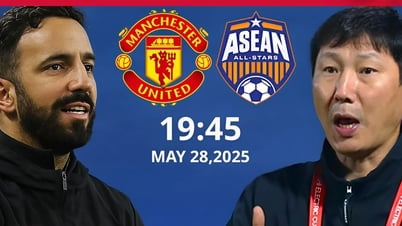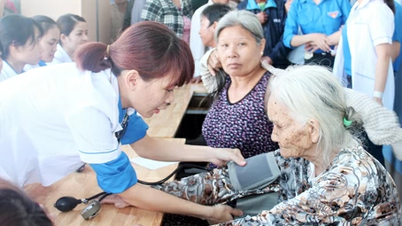In the digital age, it is becoming more common for parents to share their children’s academic achievements on social media. This action comes from pride, but also raises many questions about privacy, psychology and child development.
VietNamNet invites readers to share their perspectives on this issue.
After the article “Why Literature Teachers Hope Parents Don’t Show Off Their Children’s Academic Achievements Online”, VietNamNet received many comments and opinions on this issue. The article below by Mr. Le Tan Thoi, a teacher at Nguyen Dang Son Secondary School (An Thoi District, An Giang ) is a teacher’s perspective on respecting children’s privacy when sharing their achievements online.
When expressing to his mother that he did not want his report card and academic achievements to appear online, the 7th grader boldly cited the 2016 Law on Children - according to which, children aged 7 and above have the right to be consulted before their parents publicly disclose personal information or images online. Otherwise, this behavior can be considered a violation of children's privacy.
The story was told by a parent at the end of the school year, but it left me, an English teacher, with many thoughts. I appreciate the way the student applied the knowledge he learned at school to protect his personal rights. He also mentioned the term "sharenting" - a combination of "share" and "parenting" - a concept currently taught in English classes to talk about the trend of parents sharing too much information and images of their children online.

In fact, showing off that their children are good at studying, have won awards, or have passed entrance exams to specialized schools... has become a familiar trend on Facebook and Zalo for many parents. The purpose seems legitimate: to preserve memories, share joy, and inspire. But sometimes, adults forget that children also have their own world and the right to protect that privacy.
A friend of mine has a very smart son, always getting high scores, participating in many competitions and TV shows. His achievements are constantly posted and receive countless compliments. But that fame gradually becomes invisible pressure. To maintain the "good student brand", the boy immerses himself in studying, rarely participates in group activities, and hardly has a real vacation. Recently, the boy has started to show signs of fatigue, boredom and mental decline. The doctor diagnosed the child with depression due to lack of communication and life skills - a worrying consequence of being placed on too high expectations, and perhaps also from the parents' unintentional "exposure" on the internet.
Popularity from social networks can make children complacent, have illusions about themselves or behave inappropriately with friends and teachers. Prolonged psychological instability can seriously affect children's comprehensive development.
Therefore, in the digital age, when personal information is easily spread, it is essential for parents to respect their children's privacy and feelings. Even if their children have outstanding abilities, instead of turning them into a "brand" to show off, parents should act as companions, guiding their children to understand their own values.
Children don't always have the words or the courage to say what they think. Parents need to learn to listen - really listen - and help their children develop critical thinking skills, confidence and resilience in today's world.
Parents should pause before hitting the “share” button. Ask: Does my child agree, and How will this benefit my child’s development? This small act is the way for parents to become responsible digital citizens, not only in the family but also in society.
Moderneducation is not only about knowledge in books, but also about understanding, companionship and mutual respect between parents and children. As society develops, the way of raising children also needs to change in a positive direction - both in line with tradition and not far from the reality of integration.
Source: https://vietnamnet.vn/khoe-thanh-tich-tren-mang-niem-tu-hao-cua-cha-me-hay-ganh-nang-voi-tre-2404542.html


![[Photo] Vietnamese and Hungarian leaders attend the opening of the exhibition by photographer Bozoky Dezso](https://vphoto.vietnam.vn/thumb/1200x675/vietnam/resource/IMAGE/2025/5/28/b478be84f13042aebc74e077c4756e4b)
![[Photo] General Secretary To Lam works with the Central Policy and Strategy Committee](https://vphoto.vietnam.vn/thumb/1200x675/vietnam/resource/IMAGE/2025/5/28/7b31a656d8a148d4b7e7ca66463a6894)

![[Photo] 12th grade students say goodbye at the closing ceremony, preparing to embark on a new journey](https://vphoto.vietnam.vn/thumb/1200x675/vietnam/resource/IMAGE/2025/5/28/42ac3d300d214e7b8db4a03feeed3f6a)

![[Photo] Prime Minister Pham Minh Chinh receives a bipartisan delegation of US House of Representatives](https://vphoto.vietnam.vn/thumb/1200x675/vietnam/resource/IMAGE/2025/5/28/468e61546b664d3f98dc75f6a3c2c880)


















































































Comment (0)